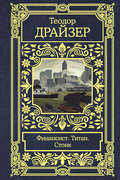
Теодор Драйзер
Финансист / The Financier
Chapter VI
The Cowperwood family was by this time established in its new and larger and more tastefully furnished house on North Front Street, facing the river.
Their company was not very distinguished, but it included a number of people who were successful – heads of small businesses, dealers in dry-goods[31], leather, groceries (wholesale), and grain.
And during the first year of the new life in this house Frank met a certain Mrs. Semple[32], who interested him greatly. Her husband had a big shoe store on Chestnut Street, and was planning to open a second one farther out on the same street.
Lillian Semple caught and held Frank's interest. Why? It would be hard to say, for she was really not suited to him emotionally, intellectually, or otherwise. He was not without experience with women or girls, and still held a tentative relationship with Marjorie Stafford; but Lillian Semple, in spite of the fact that she was married, seemed not wiser and saner, but more worth while. She was twenty-four as opposed to Frank's nineteen, but still young enough in her thoughts. She was slightly taller than he. Her hair was the color of a dried English walnut, rich and plentiful, her eyes varied from gray to blue and from gray to brown, according to the light in which you saw them. Her hands were thin, her nose straight, her face artistically narrow. She was not brilliant, not active, but rather peaceful and statuesque without knowing it. Cowperwood was carried away by her appearance. She was lovely, he thought – gracious, dignified. If he could have his choice of a wife, this was the kind of a girl he would like to have.
Cowperwood's judgment of women was temperamental rather than intellectual. Homely woman meant nothing to him. And the passionate woman meant much. He preferred to think of people – even women – as honestly, frankly self-interested. He could not have told you why. He wanted contact which was intimate, subtle, individual, personal.
So came Lillian Semple, who was nothing more to him than the shadow of an ideal. His thoughts continued to dwell on her, notwithstanding the hectic days which now passed like flashes of light in his new business venture. For this stock exchange world in which he now found himself, was most fascinating to Cowperwood.
Young Cowperwood would not have been admitted at all, as either a broker or broker's agent or assistant, except that Tighe, feeling that he needed him and believing that he would be very useful, bought him a seat on 'change – charging the two thousand dollars it cost as a debt and then ostensibly taking him into partnership. Cowperwood was put under the direction of Mr. Arthur Rivers[33], the regular floor man[34] of Tighe & Company.
Rivers was an exceedingly forceful man of thirty-five, well-dressed, well-formed, with a hard, smooth, evenly chiseled face, which was ornamented by a short, black mustache and fine, black, clearly penciled eyebrows. His chin was faintly and attractively cleft. He had a soft voice, and a quiet, conservative manner. Cowperwood wondered at first why Rivers should work for Tighe, but afterward learned that Tighe was the organizer, Rivers the floor and outside man[35].
It was useless, as Frank soon found, to try to figure out exactly why stocks rose and fell. Some general reasons there were, of course, as he was told by Tighe, but they could not always be depended on.
“Sure, anything can make or break a market,” Tighe explained. “It's a most unusual world, Cowperwood. No man can explain it. I've seen breaks in stocks that you could never explain at all – no one could. It wouldn't be possible to find out why they broke. I've seen rises the same way. My God, the rumors of the stock exchange! Ask Rivers to show you everything. Dont you ever lose for me[36], though. That's the cardinal sin in this office.” He grinned maliciously.
Cowperwood understood. This subtle world appealed to him. It answered to his temperament.
There were rumors, rumors, rumors – of great railway and street-car undertakings, land developments, government revision of the tariff, war between France and Turkey, famine in Russia or Ireland, and so on. The first Atlantic cable had not been laid as yet, and news of any kind from abroad was slow and meager.
Frank soon understood the situation. A “bull,” he learned, was one who bought in anticipation of a higher price to come. He sold to “realize” his profit, or if his margins were exhausted he was “wiped out.” A “bear” was one who sold stocks which most frequently he did not have, in anticipation of a lower price, at which he could buy and satisfy his previous sales. And so on.
He smiled at first at the air of great secrecy and wisdom on the part of the younger men. They were so heartily and foolishly suspicious. The older men, as a rule, were inscrutable. They pretended indifference, uncertainty. Snap! and the opportunity was gone. Somebody else had picked up what you wanted. All had their little note-books.
A gong sounded the call to trading at ten o'clock, and fifty to a hundred men would shout, gesticulate, shove here and there; endeavoring to take advantage of the stock offered or called for.
“Five-eighths for five hundred P. and W.,” some one would call – Rivers or Cowperwood, or any other broker.
“Five hundred at three-fourths,” would come the reply from someone else, who either had an order to sell the stock at that price. The professional traders were, of course, keen students of psychology; and their success depended on their ability to guess whether or not a broker representing a big manipulator, like Tighe, had an order large enough to affect the market sufficiently to give them an opportunity to “get in and out[37],” as they termed it, at a profit before he had completed the execution of his order. They were like hawks watching for an opportunity to snatch their prey from under the very claws of their opponents.
Distorted faces were shoved over shoulders or under arms. The most ridiculous grimaces were purposely or unconsciously indulged in. At first it seemed quite a wonderful thing to young Cowperwood, for he liked human presence and activity; but a little later he came down to a clearer sense of the intricacies of the problem before him. Buying and selling stocks, as he soon learned, was an art, a subtlety, almost a psychic emotion. Suspicion, intuition, feeling – these were the most important things there.
Yet in time he also asked himself, who was it who made the real money – the stock-brokers? Not at all. Some of them were making money, but they were, as he quickly saw, like a lot of gulls or stormy petrels, hungry and anxious to snap up any unwary fish. Back of them were other men, men with shrewd ideas, subtle resources. Men of immense means whose enterprise and holdings these stocks represented, the men who schemed out and built the railroads, opened the mines, organized trading enterprises, and built up immense manufactories. They might use brokers or other agents to buy and sell on change. These men were gamblers. He was nothing more than a gambler's agent. It was not troubling him any just at this moment, but it was not at all a mystery now, what he was. A man, a real man, must never be an agent, a tool, or a gambler – acting for himself or for others – he must employ such. A real man – a financier – was never a tool. He used tools. He created. He led.
Clearly, very clearly, at nineteen, twenty, and twenty-one years of age, he saw all this, but he was not quite ready yet to do anything about it. He was certain, however, that his day would come.
Chapter VII
In the meantime, his interest in Mrs. Semple had been secretly and strangely growing. When he received an invitation to call at the Semple home, he accepted with a great deal of pleasure. Their house was located not so very far from his own, on North Front Street.
It could not be said that Lillian had wildly loved Mr. Semple at any time. Although she had cheerfully married him, he was not the kind of man who could arouse a notable passion in any woman. He was practical, methodic, orderly. His shoe store was a good one. He loved to talk, when he talked at all, of shoe manufacturing, the development of styles.
Cowperwood could not keep his eyes off her. She was aware of this but she did not attach any significance to it.
At first, when Frank came, she did not have much to say. She was gracious, but the burden of conversation fell on her husband. Cowperwood watched the varying expression of her face from time to time. Mr. Semple talked to him pleasantly, because in the first place Frank was becoming financially significant, was suave and ingratiating, and Frank represented progress to him. One spring evening they sat on the porch and talked – nothing very important – slavery, street-cars, the panic – it was on then, that of 1857 – the development of the West. Mr. Semple wanted to know all about the stock exchange. In return Frank asked about the shoe business, though he really did not care. All the while he watched Mrs. Semple. Her manner, he thought, was soothing, attractive, delightful. She served tea and cake for them. They went inside after a time to avoid the mosquitoes. She played the piano. At ten o'clock he left.
Thereafter, for a year or so, Cowperwood bought his shoes of Mr. Semple. About a year later, Mr. Semple died. It was an untimely death. He was seized with a cold in the chest late in the autumn – and had insisted on going to business when Mrs. Semple urged him to stay at home and recuperate. Then nine more days of pneumonia – and he was dead. The shoe store was closed for a few days; the house was full of sympathetic friends and church people. There was a funeral with burial service in the church, and then he was buried. Mrs. Semple cried bitterly.
The shock of death affected her greatly and left her for a time in a depressed state. She continued to reside in the Front Street house, and was considered a charming and interesting widow.
Young Cowperwood, only twenty years of age, was resolute. He attended the funeral. He helped her brother, David Wiggin[38], dispose of the shoe business.
Again, it would be hard to say what he saw in Semple. Her prettiness fascinated him; her indifference aroused perhaps his combative soul. He could not have explained why, but he wanted her in an urgent, passionate way. He could not think of her reasonably, and he did not talk of her much to anyone. He was genial, cheerful, gay at most times, without being talkative, and he was decidedly successful. Everybody knew he was making money now. His salary was fifty dollars a week, and he was certain soon to get more. Some lots of his, bought three years before, had increased notably in value. He was liked in the financial district and he was sure that he had a successful future.
Because of his analysis of the brokerage situation he had come to the conclusion that he did not want to be a stock gambler. Instead, he was considering the matter of engaging in bill-brokering[39], a business which he had observed to be very profitable and which involved no risk as long as one had capital. Through his work and his father's connections he had met many people – merchants, bankers, traders. People in Drexel & Co. and Clark & Co. were friendly to him. Jay Cooke, a rising banking personality, was a personal friend of his.
Meanwhile he called on Mrs. Semple, and the more he called the better he liked her. He advised her about her business affairs in so intelligent a way that even her relatives approved of it. She came to like him, because he was so considerate, quiet, reassuring, and so ready to explain over and over until everything was quite plain to her. She could see that he was looking on her affairs quite as if they were his own, trying to make them safe and secure.
“You're so very kind, Frank,” she said to him, one night. “I'm awfully grateful. I don't know what I would have done without you.”
She looked at his handsome face, which was turned to hers, with child-like simplicity.
“Not at all. Not at all. I want to do it. I wouldn't have been happy if I couldn't.”
She felt warm toward him, sympathetic, quite satisfied that she could lean on him.
“Well, I am very grateful just the same. You've been so good. Come out Sunday again, if you want to, or any evening. I'll be home.”
That time his Uncle Seneca died in Cuba and left him fifteen thousand dollars. He knew exactly what to do with that money. A panic had come since Mr. Semple had died, which had illustrated to him very clearly what an uncertain thing the brokerage business was. There was really a severe business depression.
During all these days young Cowperwood was following these financial complications with interest. He was not disturbed by the cause of slavery, or the talk of secession, or the general progress or decline of the country, except in so far as it affected his immediate interests. He wanted to become a stable financier; but, now that he saw the inside of the brokerage business, he was not so sure that he wanted to stay in it. The panic only made Frank more certain as to what he really wanted to do – now that he had this free money, he would go into business for himself. Even Tighe's offer of a minor partnership did not tempt him.
“I think you have a nice business,” he explained, in refusing, “but I want to get in the note-brokerage business for myself. I don't trust this stock game. I'd rather have a little business of my own than all the floor work in this world.”
“But you're pretty young, Frank,” argued his employer. “You have lots of time to work for yourself.”
In the end he parted friends with both Tighe and Rivers.
“That's a smart young fellow,” observed Tighe, ruefully.
“He's the shrewdest boy of his age I ever saw,” rejoined Rivers.
Chapter VIII
Cowperwood was in love and had money of his own to start his new business venture. He had established financial relations with the Girard National Bank. All he wanted was suitable investments – things in which he could realize surely, quickly. He saw fine prospective profits in the street-car lines, which were rapidly developing.
He purchased a horse and buggy about this time – the most attractive-looking animal and vehicle he could find – the combination cost him five hundred dollars – and invited Mrs. Semple to drive with him. She refused at first, but later consented. He had told her of his success, his prospects, his windfall of fifteen thousand dollars, his intention of going into the note-brokerage business[40]. She knew his father was likely to succeed to the position of vice-president in the Third National Bank, and she liked the Cowperwoods. Now she began to realize that there was something more than mere friendship here. This erstwhile boy was a man. It was almost ridiculous in the face of things – her seniority, her widowhood, her placid, retiring disposition – but the force of this young man was sheer, quiet, and determined.
Cowperwood did not delude himself with her. She was beautiful, with a mental and physical lure for him that was irresistible, and that was all he desired to know. No other woman was holding him like that. It never occurred to him that he could not or should not like other women at the same time. He was not eager for her money, though he was well aware of it. He felt that he could use it to her advantage. He wanted her physically. He felt a keen, primitive interest in the children they would have. He wanted to find out if he could make her love him vigorously and could rout out the memory of her former life. Strange ambition. Strange perversion, one might almost say.
In spite of her fears and her uncertainty, Lillian Semple accepted his attentions and interest because she was drawn to him. One night, when she was going to bed, she stopped in front of her dressing table and looked at her face and her bare neck and arms. They were very pretty. She thought of young Cowperwood, and then was chilled and shamed by the vision of the late Mr. Semple.
“Why do you come to see me so often?” she asked him when he called the following evening.
“Oh, don't you know?” he replied.
“No.”
“Sure you don't?”
“Well, I know you liked Mr. Semple, and I always thought you liked me as his wife. He's gone, though, now.”
“And you're here,” he replied.
“And I'm here?”
“Yes. I like you. I like to be with you. Don't you like me?”
“Why, I've never thought of it. You're so much younger. I'm five years older than you are.”
“In years,” he said, “certainly. That's nothing. I'm fifteen years older than you are in other ways. I know more about life in some ways than you can ever hope to learn – don't you think so?” he added, softly, persuasively.
“Well, that's true. But I know a lot of things you don't know.” She laughed softly, showing her pretty teeth.
It was evening. The river was before them.
“Yes, but that's only because you're a woman. But I'm talking about practical affairs of this world. You're not as old that way as I am.”
“Well, what of it?”
“Nothing. You asked why I came to see you. That's why.”
He stared at the water.
She looked at him. His handsome body, his face, his clear, big, inscrutable eyes, had an expression which was almost babyish. She could not have guessed the depths it veiled. His cheeks were pink, his hands not large, but sinewy and strong.
“I don't think you ought to come to see me so often. People won't think well of it.”
“People,” he said, “don't worry about people. People think what you want them to think. I like you.”
“But you mustn't like me. It's wrong. I can't ever marry you. You're too young. I'm too old.”
“Don't say that!” he said, imperiously. “There's nothing to it. I want you to marry me. You know I do. Now, when will it be?”
“Why, how silly! I never heard of such a thing!” she exclaimed. “It will never be, Frank. It can't be!”
“Why can't it?” he asked.
“Because – well, because I'm older. People would think it strange. I'm not long enough free.”
“Oh, long enough nothing!” he exclaimed, irritably. “That's the one thing I have against you – you are so worried about what people think. They don't make your life. They certainly don't make mine. Think of yourself first. You have your own life to make. Are you going to let what other people think stand in the way of what you want to do?”
“But I don't want to,” she smiled.
He arose and came over to her, looking into her eyes.
“Well?” she asked, nervously, quizzically.
He merely looked at her.
“Well?” she queried, more flustered.
He stooped down to take her arms, but she got up.
“Now you must not come near me,” she pleaded, determinedly. “I'll go in the house, and I'll not let you come any more. It's terrible! You're silly! You mustn't interest yourself in me.”
But he called again and again. Then one night, when they had gone inside because of the mosquitoes, and when she had insisted that he must stop coming to see her, that his attentions were noticeable to others, and that she would be disgraced, he caught her, under desperate protest, in his arms.
“Now, see here!” she exclaimed. “I told you! It's silly! You mustn't kiss me! How dare you! Oh! oh! oh!”
She ran up the stairway to her room. Cowperwood followed her swiftly. As she pushed the door, he forced it open and recaptured her. He lifted her bodily from her feet and held her crosswise, lying in his arms.
“Oh, how could you!” she exclaimed. “I will never speak to you any more. I will never let you come here any more if you don't put me down this minute. Put me down!”
“I'll put you down, sweet,” he said. “I'll take you down,” at the same time pulling her face to him and kissing her. He was very much excited.
While she was twisting and protesting, he carried her down the stairs again into the living-room, and seated himself in the great armchair, still holding her tight in his arms.
“Oh!” she sighed. Then she smiled. “How would I ever explain if I did marry you?” she asked, weakly. “Your father! Your mother!”
“You don't need to explain. I'll do that. And you needn't worry about my family. They won't care.”
“But mine,” she recoiled.
“Don't worry about yours. I'm not marrying your family. I'm marrying you. We are independent.”
And he kissed her. There was a persuasion to his caresses. Mr. Semple had never displayed any such fire. He aroused a force of feeling in her which had not previously been there. She was afraid of it and ashamed.
“Will you marry me in a month?” he asked, cheerfully, when she paused.
“You know I won't!” she exclaimed, nervously. “The idea! Why do you ask?”
“What difference does it make? We're going to get married eventually.”
“Well, not in a month. Wait a little while. I will marry you after a while – after you see whether you want me.”
He caught her tight. “I'll show you,” he said.
“Please stop. You hurt me.”
“How about two months?”
“Certainly not.”
“Three?”
“Well, maybe.”
“No maybe in that case. We marry.”
“But you're only a boy.”
“Don't worry about me. You'll find out how much of a boy I am.”
He opened up a new world to her, and she realized that she had never really lived before. This man represented something bigger and stronger than ever her husband had dreamed of. He was terrible, irresistible.
“Well, in three months then,” she whispered.







